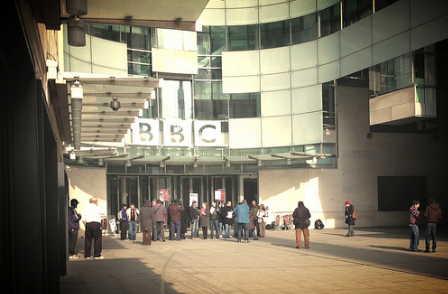
Picketing is taking place at more than 20 locations as part of today BBC strike, according to the National Union of Journalists.
According to the union the "overwhelming majority" of the BBC's 4,000-plus NUJ members are taking part in the action, which has seen radio and television schedules disrupted today.
According to the NUJ picket lines have been set up in London, Birmingham, Cardiff, Glasgow and Belfast among other places. BBC staff in other countries have also joined in the strike and a picket line has been set up in Turkey.
"The BBC have not engaged in any meaningful discussions about the dispute which is very unfortunate and a great disappointment, and an abdication of responsibility for a public service broadcaster," NUJ general secretary Michelle Stanistreet told Press Gazette.
"It's likely we will be re-balloting, so there will be a new ballot for industrial action as ours will be running out at the end of this month, so this issue will not go away. Members' resolve will not weaken, and people are not prepared to stand by and see their colleagues forced out of the door when, if the BBC management engage its brain, we could approach this constructively through fine-tuning the redeployment policy and making sure that people are slotted into vacancies that exist."
Here are some BBC journalists on strike who have taken to Twitter to explain why they are taking action:
Standing firm with my colleagues who have begun a 24 hour strike. Quality and reputation of the BBC needs defending now more than ever.
— Dave Lee (@davelee) February 18, 2013
@davelee Standing shoulder to shoulder, brother!
— Stephen Pritchard (@s_pritchard) February 18, 2013
Defending quality for listeners, viewers, and news web site users. Protecting the jobs of colleagues facing redundancy. #BBCStrike
— Huw Williams (@HuwDWilliams) February 18, 2013
BBC strike is now. We're walking out for 24 hours twitter.com/roxy_esco/stat…
— Roxanne Escobales (@roxy_esco) February 18, 2013
#BBCStrike #NUJ BBC cannot keep sacking journalists and sustaining its output, there are limits to the hours in Andrew Neil's week
— Ian Young (@youngian67) February 18, 2013
Just finished strike stint at BBC Belfast, lots of honks from motorists and one British Airways stewardess stopped to chat & wish us luck
— Arthur Strain (@Fronkenstrain) February 18, 2013
Not asked to fill in at the BBC this time round!…I support the #bbcstrike on principle,in practise good not to have to turn down work
— Robyn Dwyer (@robyndwyer) February 18, 2013
No amount of money would make me sit on BBC News, looking straight down the camera, and admit that I'd crossed the picket line. #bbcstrike
— Anya Reevell (@anyagrace) February 18, 2013
"As far as I see it, when the union calls a strike, you come out – it's unequivocal," a picketer in London told Press Gazette.
"It's about withholding labour. All the major Radio 4 news programs have not been on air today, there was no regular BBC breakfast from Salford, it had to be made up with whatever management could cobble together, with a mix of that and repeats of other programs.
"There are several high profile six music presenters who are mysteriously not on air today, whether that's because they won't cross picket lines is not for me to say. u"We'll see what impact today has on negotiations between the Union and management and assess the situation and go from there."
Outside the corporation NUJ members have been showing their support while others bemoaned the lack of BBC content today.
Paul Callaghan, Partner at International Law Firm Taylor Wessing, said: “It is unsurprising to see the NUJ take strike action. If it is true that the BBC is advertising jobs which journalists’ who are at risk of redundancy could do, then any dismissals may well be unfair in law.
"The law requires an employer to offer suitable alternative positions to employees who are at risk of redundancy, and technically have ‘the skills’ required for these roles, as opposed to advertising for new staff.
"Whether they have ‘the skills’ may often be open to argument, but at a minimum, the BBC should consult with the employees losing their jobs about these other roles, rather than making a decision without getting their views.”
According to the BBC around 30 journalism jobs are currently at risk of compulsory redundancy. The NUJ has condemned any compulsory redundancies and is asking that staff instead be redployed. The NUJ said last week that it objected to journalists from outside the BBC being recruited on temporary contracts when staff were at risk of being sacked.
Email pged@pressgazette.co.uk to point out mistakes, provide story tips or send in a letter for publication on our "Letters Page" blog
